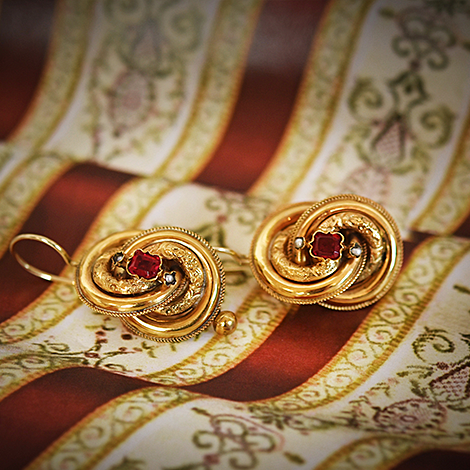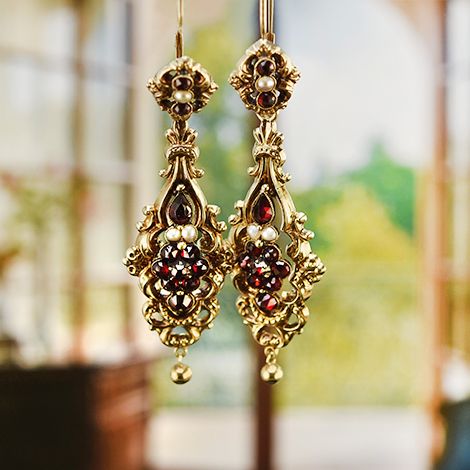Biedermeier Earrings
The move away from classicism

Antique Biedermeier earrings made of gold were characterised by lush ornamentation in combination with gemstones typical of the region, such as Bohemian garnet or Italian coral. The strict forms of classicism were largely discarded and natural motifs such as foliage and flowers were favoured, in keeping with the romantic tendencies of the era.
„All that glitters is not gold“
The political situation immediately after the Napoleonic Wars led to a shortage of precious metals. Biedermeier jewellery was therefore mainly made from foam gold. A sophisticated technique in which thin sheets of gold were pressed or driven into the desired shape and then filled with putty, resin or sand to provide the necessary stability. Base metals such as pinchbeck and tombac were also used as an adequate substitute for gold.
The classic Biedermeier earring
Biedermeier earrings made of foam gold were often factory-made and followed a typical structure. A cartouche decorated with volutes, foliage or rocailles provided space for a central stone setting, cameos or miniatures. Cord and beadwork decoration set delicate accents and emphasised the sculptural structure of the jewellery pieces.
A popular stylistic device of antique Biedermeier earrings were also decorative pendants, which were either attached to the cartouche in large numbers or complemented the earring individually, often in a conical shape.
Earrings and hoops
At the beginning of the Biedermeier period, people favoured large round earrings (known today as hoop earrings), which were decorated on the front with ornamental elements and precious stones. The inside of the hoop often contained s-shaped elements to prevent the decorated front from slipping.
Lesser known today, Viennese brisures were not uncommon as part of foam gold earrings. These were clasp hooks which, contrary to today's practice, were not fastened behind the earlobe but at the front of the ear.

Turning one into two: changeable earrings
The aforementioned hair fashion of the time was virtually predestined for long, multi-layered earrings, which could be worn both during the day and for evening wear thanks to their ingenious design. They had removable elements, which turned the long earring into a shorter model for daytime wear.
In combination with the matching Biedermeier brooches, bangles and necklaces, so-called parures (jewellery sets) were created, which are still precious and sought-after objects on the antique jewellery market today.
Biedermeier jewellery at Halsbandaffaire
If you would like to buy Biedermeier earrings, our trained experts at Halsbandaffaire will be happy to help you. Feel free to explore our entire range on site in Munich or order from the comfort of your own home via our online shop.